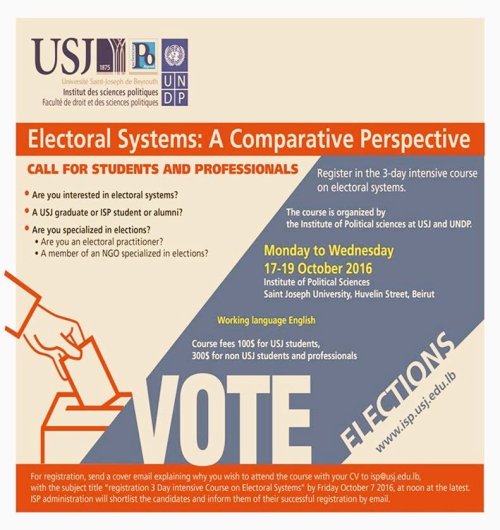CALL for students and professionals: Are you interested in electoral systems? A USJ graduate or ISP student or alumni? Are you specialized in elections? Are you an electoral practitioner? A member of an NGO specialized in elections?
Join the course on elections organised by ISP-USJ and UNDP.
 Call for registration in the 3 Day intensive Course on Electoral Systems
Call for registration in the 3 Day intensive Course on Electoral Systems
Course title: Electoral Systems: A Comparative Perspective
Dates: Monday to Wednesday 17-19 October 2016
Location: Institute of Political Sciences, USJ , Huvelin Street, Beirut
Working language: English
Course overview:
The course is a short, intensive and participatory learning experience for electoral practitioners and graduates interested in exploring the essentials of the structure and functions of electoral systems from a comparative international perspective, and understanding the practical use of electoral systems as instruments for inclusion, representation and delivery capacity of democratic governments.
The course will cover the following broad issues around electoral systems:
- Electoral systems as rules of the game for elections with discussion on where the rules are embodied, the essence of democracy as a government of the people, main elements of electoral systems including formula of representation, and the relevance of the type of electoral management bodies for the working of the electoral system.
- Electoral system families around the world with review of proportional, majority and mix systems, and the variations within each family. Comparative look at electoral systems used around the world and those in the Arab region.
- Inclusion and representation through electoral systems with a review of demographic versus territorial representation, gender and minority representation, the inclusion of poor, illiterate and persons with disabilities in the electoral system, and dealing with electoral justice in making electoral systems effective. Linkages between the different formulas of representation with the interests of politicians and leaders.
The course involves completing three days of interactive sessions, lectures and review of country experiences; daily group work will lead to the required end of course assignment. Participants will receive a certificate of completion.
The course will be led Professor Rafael López-Pintor, a pioneer in the democracy promotion movement who has helped improve the electoral systems of more than twenty countries. He will be assisted by Wissam Lahham and Rita Chemaly from the Political Science Institute. Other professors and experts in the field will also contribute to the interactive sessions, lectures and best practice case studies, fostering innovation, creative learning and networking amongst peers.
Detailed program of the 3 days can be downloaded :
http://www.isp.usj.edu.lb/pdf/ELECTORAL%20SYSTEMS%20%20course%20outline_Online%20Version.pdf
Course fees: 100$ for USJ students, 300$ for non USJ students and professionals
For registration, send a cover email explaining why you wish to attend the course with your CV to isp@usj.edu.lb, with the subject title “registration 3 Day intensive Course on Electoral Systems” by Friday October 7 2016, at noon at the latest. ISP administration will shortlist the candidates and inform them of their successful registration by email
Read Full Post »



 Call for registration in the 3 Day intensive Course on Electoral Systems
Call for registration in the 3 Day intensive Course on Electoral Systems



















